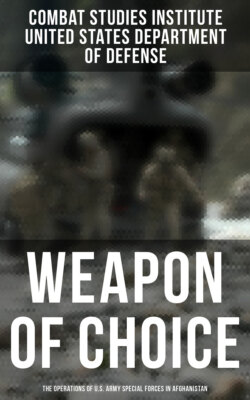Читать книгу Weapon of Choice: The Operations of U.S. Army Special Forces in Afghanistan - Combat Studies Institute - Страница 32
На сайте Литреса книга снята с продажи.
Staff “Battle Captain”: The Combat Operations “Pulse Monitor”
ОглавлениеWhile the J3, LTC Warren Richards, an augmentee from the Special Operations Command, U.S. Joint Forces Command (SOCJFCOM), Norfolk, directed daily operations and activities in the JOC, the staff “battle captains” were responsible for maintaining constant situational awareness. CPT Mason Arquette (pseudonym) learned his new duties as he performed them. The most important task for the tall, lean West Pointer was to keep COL Mulholland and the J3 up to date on “everything of note” that the task force was doing. It was the “everything of note” that kept Arquette scrambling because that grew each day as the UW campaign evolved. At the regularly scheduled morning and evening briefings, “Battle Captain” Arquette formally presented this information, including the availability of transport and combat aircraft (Air Force and Army); the exact number of personnel assigned to CJSOTF-North, where they were, and what they were doing; summaries of all classified message traffic in and out of the JSOTF; and a myriad of other issues facing a tactical commander in wartime who had also served as the senior American military officer in Uzbekistan and as Stronghold Freedom commander.
For most of the 5th SFG staff officers and their commander (COL Mulholland took command of the 5th SFG two months before 9/11), serving as the nucleus of a special operations task force that was evolving into a joint headquarters JSOTF was “a challenge a minute.” Integrating staff from the other services and USAR and ARNG augmentees was a constant process, especially when some services rotated personnel after 45 to 90 days in country. Despite not having had the opportunity to practice group-level operations in the field or having participated in a large-scale UW exercise since Mulholland’s arrival, the 5th SFG staff under the tutelage of several experienced JFCOM officers fought the war well.
The daily pace in the JOC was relentless. Arquette, a parachute infantry officer before joining the Special Forces, worked 18- to 20-hour days the first week. With the arrival of another staff captain, his duties were pared to just the “Day Battle Captain.” This reduced the work shift to only 14 to 15 hours a day—12 hours on duty and an hour of transition with the “Night Battle Captain” before and after each shift change. There were no days off for Arquette or for anyone serving on the CJSOTF-North staff, which is typical during war. On 13 October, just three days after arriving at K2, JSOTF-North issued the mission order to the Special Forces ODA that would initiate the UW campaign in Afghanistan.
